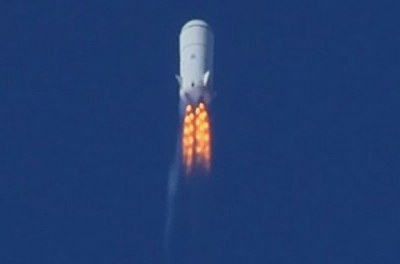|
|
 Blue Origin’s test vehicle in flight shortly before it was lost during a flight last month. (credit: Blue Origin) |
Euphemistically speaking
by Dwayne A. Day
Monday, September 19, 2011

If a rocket fails it usually doesn’t flutter to the ground like a butterfly on gossamer wings, gently kissing the Earth it has just left. These events tend to be… catastrophic. Nevertheless, companies have a tendency to, well, sugarcoat the reality and avoid using words that actually describe anything catastrophic (see “I write sins, not tragedies”, The Space Review, February 5, 2007). This has happened time and time again. Here are just a few examples:
“The first Ariane-5 flight did not result in validation of Europe’s new launcher.”
(June 1996. The rocket self-destructed.)
“The Sea Launch Zenit-3SL vehicle, carrying the NSS-8 satellite, experienced an anomaly today during launch operations. Sea Launch will establish a Failure Review Oversight Board to determine the root cause of this anomaly.”
(January 2007. The rocket exploded on the launch pad.)
“Successful Short Hop, Setback, and Next Vehicle. …last week we lost the vehicle during a developmental test at Mach 1.2 and an altitude of 45,000 feet. A flight instability drove an angle of attack that triggered our range safety system to terminate thrust on the vehicle.”
(August 2011. The Blue Origin rocket probably disintegrated supersonically at 45,000 feet.)
Perhaps what we need is an entirely new word to describe the fiery explosion of a launch vehicle so that the public affairs people at rocket companies no longer need to resort to words like “anomaly” or “setback.” Feel free to suggest your own.
Dwayne Day used to get all A’s in English class in high school (French and German were different matters entirely). He can be reached at zirconic1@cox.net.
|
|